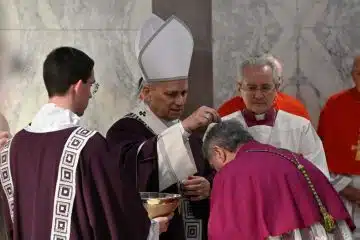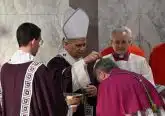False Prophets
October 5, 2012
By Jeanne Hunt
Batten down your hatches, church; false prophets live and walk among us.
We don’t know who to believe anymore. First, it’s the weather prophets who tell us that it will rain for three days and nights and that we better start building the ark. Then, much to our surprise, the sky spits for an hour and we are out watering the lawn by nightfall. (Let us not mention the “white death” otherwise known as snow. I can’t remember the last time the weather prophets got that one right.)
Other false prophets in our midst are the financial forecasters who tell us to refinance the house, invest in commodities, buy gold and so on. Then there are Mother Nature’s prophets who want us to observe the caterpillars for signs of a rough winter, put out salt lick for the deer herds in our city and otherwise interfere with the Creator’s agenda.
Another amazing phony is the guy on television selling solutions to any and every problem: dirty grout, animal hair on the furniture, and of course, 30 pounds of “unwanted fat.” (The only way I have found to lose weight is to eat less.) And finally, we encounter medical prophets who tell us to consume or not to consume: coffee, bacon, fruit, pasta, bologna, butter, white flour, eggs and red meat.
What all this teaches us is that a lot of well-intentioned people do not know what they are talking about. As my father used to say, “Don’t believe anything you hear and only half of what you see.” What is required is that we think things out for ourselves and turn to time-honored wisdom. In the case of the weather, it is often far better to turn the television off and go outside. Smell the air, look at the sky, feel the breeze. We begin to learn the way of the weather for ourselves.
But this system of unearthing the truth needs to go a bit farther: A few Catholics are telling us that the Vatican II Council was a huge mistake. They are working fervently to restore our faith to its pre-Vatican II ways.
As we celebrate the 50th anniversary of that historical gathering of theologians, cardinals, bishops, and the wisest souls of their day, it is important to examine its teaching for ourselves. Those wise prophets taught us to begin reading Scripture as the ever-present living Word of God, to not just watch the Mass but to pray it, to care passionately for the poor, to believe that each of us is called to serve the church — laity and ordained alike. And, most importantly, that the loving arms of God have room to embrace all our diversity of thought, devotion, and language under the wide expanse of the umbrella of this Catholic Church.
Fifty years ago, the sons and daughters of the Vatican II Council read Eugene Maly’s column in The Catholic Telegraph each week with excitement as he took us to the latest conversations of the Council. Catholics opened the Bible and read the Gospel each day and began to see that the words had a very personal message and discovered too the wisdom and grace of other faiths as “ecumenism” burst into Catholic spirituality. Lay Catholics worked in the soup kitchens and inner city schools with countless religious women who taught them to see Christ in the faces of the poor. Those were the days, my friends. I thought they would never end, but they did.
The grace and vision of Pope John the XXIII has been integrated into the church of our day in the last 50 years. In fact, many believe that it has always been this way. The inspiring music, the strides in social justice, the heroic service of the laity, and so on, stand as the precious gifts of those who allowed the Holy Spirit to lead them into a new evangelization (in the words of Pope John Paul II). Many Catholics, however, no longer embrace the teaching of that council. They yearn for a return to pre-Vatican II ways.
Before we disregard the wisdom of Mother Church that began that sacred and inspired council, we need to sort out the matter for ourselves. Amid the hyped weather forecasts, the money-making schemes, the miracle cures, and the diet regimens that promise much and deliver nothing, we owe it to the church—and ourselves—to root out false prophets.
Hunt is a nationally recognized catechetical leader and author.













